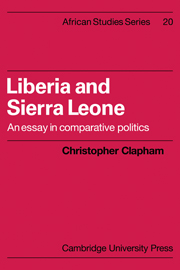Book contents
- Frontmatter
- Contents
- List of maps, tables and figures
- Preface
- Map A Liberia and Sierra Leone in West Africa
- 1 Political Comparison
- 2 Historical Summary
- 3 Resources
- 4 Rules
- 5 Political Allocation at the Centre
- 6 Centre and Periphery
- 7 Aspects of Political Economy
- 8 Concluding Review
- Statistical Appendix
- Bibliographical Note
- Notes
- Index
1 - Political Comparison
Published online by Cambridge University Press: 15 January 2010
- Frontmatter
- Contents
- List of maps, tables and figures
- Preface
- Map A Liberia and Sierra Leone in West Africa
- 1 Political Comparison
- 2 Historical Summary
- 3 Resources
- 4 Rules
- 5 Political Allocation at the Centre
- 6 Centre and Periphery
- 7 Aspects of Political Economy
- 8 Concluding Review
- Statistical Appendix
- Bibliographical Note
- Notes
- Index
Summary
Political comparison is an activity more preached than practised. Despite the centrality of comparison to the study of politics, despite the number of comparative frameworks which various authors have produced, and despite the amount of material on individual political systems which is now available, the number of studies which compare in any detail the ways in which politics works in two or more polities remains astonishingly small. Yet if political comparison is to improve our understanding of the particular, rather than merely piling up generalisations, this is precisely the kind of task which it should be able to undertake. This is what the present study tries to do, in comparing the politics of two neighbouring West African states, Liberia and Sierra Leone. I hope to be able to show how (and, in a limited way, to explain why) some aspects of politics are very similar in the two countries, whereas others are notably different. More especially, I am concerned with the relationship in each country between political activities directed towards controlling the coercive and distributive apparatus of the state, and the social and economic features of the society on which that state is built. This relationship in turn has implications for many critical issues in the politics of underdeveloped countries – the colonial legacy, control of the economy, regime stability and institutionalisation, the role of elites – though in an essay such as this, such implications can only be sketched in a highly tentative manner.
There is a lot to be said for comparing entities which are fairly similar to one another.
- Type
- Chapter
- Information
- Liberia and Sierra LeoneAn Essay in Comparative Politics, pp. 1 - 5Publisher: Cambridge University PressPrint publication year: 1976

